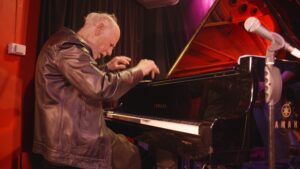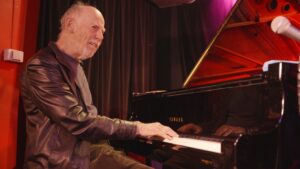Foundry 616, June 27
8/10
So it’s goodnight to Foundry 616, the lovechild of a man whose passion has been presenting jazz in Sydney for over 40 years, Peter Rechniewski. People get Orders of Australia for doing much less. But this was a hell of a penultimate gig, featuring the pianist who played the venue’s first concert 13 years ago, Mike Nock.
Across a career spanning seven decades, primarily in New Zealand, the US and Australia, Nock has proved himself a composer, improviser and band leader of the highest calibre. This was instantly evident on the opening Not We But One. Nock tells stories in music, and distils essences of emotion. Here little wisps of melody from the piano provoked response, commentary and elucidation from bassist Brett Hirst and drummer Toby Hall, the latter playing with his hands against Hirst’s groove, while Nock floated lines above them that were, by turns, pensive and supremely lyrical.

Then, as the composition’s title suggests, the three instruments seemed to converge into one, and the interaction had a profundity like fine poetry, where each word contains a deeper truth. This was music playing the musicians, rather than the other way around, and it stayed at this peak when tenor saxophonist Karl Laskowski joined, generating a gruff sound, and playing short, stabbing phrases that drove the groove rather than riding on it. Nock then reoccupied the foreground, finding typically surprising implications in what the rhythm section was offering.
The band slipped back into a safer place with Foundry Start-Up Blues, although Laskowski grabbed the piece by the scruff and made it raw and real. Much more engrossing was the contemplative Acceptance, which had Nock making little rivulets of melody flow into the gentle, bossa nova-tinged groove, before Laskowski played a solo as languid as floating downstream in a dinghy without resort to oars.
 Hall crafted a stonking, bucking solo on the boppish Transitions, and Hirst, Nock’s longest-serving collaborator, soloed with sinewy vigour on a blues in the second set, which also featured Laskowski deploying the brawny sound and loping lines beloved of Texan tenor saxophonists.
Hall crafted a stonking, bucking solo on the boppish Transitions, and Hirst, Nock’s longest-serving collaborator, soloed with sinewy vigour on a blues in the second set, which also featured Laskowski deploying the brawny sound and loping lines beloved of Texan tenor saxophonists.
Every composition presented different facets of Nock the composer and Nock the improviser. One moment we’d hear his love of rhythmic puzzles and child-like joy in the game of making music, and the next his capacity for crystalline beauty; one moment rhythmic drive and the next flurries of abstraction.
I began listening to Nock in the 1970s via records and an Australian tour when his fabled US career was peaking, and then in 1982 came the mysterious and ethereal Ondas masterpiece. When he returned to Australia permanently in 1985, he didn’t always find musicians who could consistently play at his level of invention. But he persisted. Three of the worthy ones were with him on this night, as he bid adieu to the venue that has been his second home for 13 years.